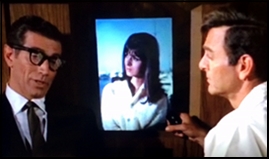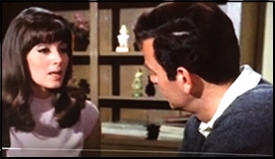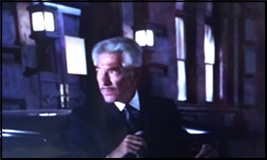Wed 28 Jul 2021
A PI TV Episode Review by Jonathan Lewis: MANNIX “The Many Deaths of Saint Christopher.”
Posted by Steve under Reviews , TV mysteries[17] Comments

MANNIX. “The Many Deaths of Saint Christopher.” CBS, 07 October 1967 (Season One, Episode 4.) Mike Connors (Joe Mannix), Joseph Campanella. Guest stars: Linda Marsh, John Marley, David Hurst, Neil Diamond. Created by Richard Levinson and William Link. Developed by Bruce Geller. Screenplay: Barry Oringer. Director: John Meredyth Lucas.
In its first season, Mannix seemed to have something of an identity crisis. Joe Mannix (Mike Connors) was presented as a tough guy detective who had very little use for the computer systems that his employer, Intertect, relied on to solve crimes. Many seem to credit the show’s lasting success to its ditching the man vs. computer concept and allowing Mannix to have his own firm – and Black secretary (a rarity those days) – beginning in season two.

To me, there remains something very stilted about the first few episodes of the first season. It’s not exactly easy to pinpoint what doesn’t work. Perhaps it’s the pacing which often seems quite arbitrary. Either things happen very slowly or so quickly that plot lines are seemingly reshaped in a matter of minutes.
Such is the case for “The Many Deaths of St. Christopher,†the show’s fourth episode. There’s a quite confusing sequence before the initial credits. Then the episode begins with Mannix’s boss Lew Wickersham (Joseph Campanella), telling him about a new case. Three German businessmen are looking for a former work colleague who has allegedly absconded with a trade secret and is threatening blackmail.

They want to hire Mannix to find the man in question and suggest using the man’s daughter as bait. Here’s where things get confusing. Why don’t the men just do the job themselves? They seem capable and well financed. Well, that’s never really explained.
Soon it is revealed, however, that the men are Serbian nationals on a vengeance mission against a Nazi war criminal responsible for the man who massacred civilians in their village. But are the men even being honest about that? That’s where things get a little topsy turvy and Mannix must figure things out.

All told, it’s not a particularly convincing bit of storytelling. One would think Joe Mannix of all people would be savvier than he ends up being in much of this episode.
Final point. Although this first season episode of Mannix is nominally about Nazi war crimes in Serbia during World War II and the long shadow of the Second World War, what ends up being far more memorable is the appearance of a youthful Neil Diamond as a nightclub singer. It’s a nice little slice of 1960s LA that nonetheless seems oddly out of place in an episode nominally concerning heavy subject matter.
July 28th, 2021 at 8:55 pm
The idea for the first season of Mannix was better explored in the pilot and the brief series SEARCH/PROBE, largely because the technology was much cooler and more intrusive.
I can’t quite nail what is wrong with early Mannix other than the fact the character of Mannix is such a well drawn private eye in the classic tradition the idea of him working for Interect is totally foreign. It feels as if they put Mike Hammer in a cublicle with an adding machine.
Largely it feels as if no one involved actually bought the premise.
Then too they so stacked the odds in Mannix favor there was no drama to the premise. Intertect never came anywhere near matching Mannix’s instincts.
It reminded me a bit of when writers in the Golden Age would have their amateur sleuth try to open an office as a sort of private detective, then after a single book ignore the idea or use it so sparingly it surprises the reader when they are reminded of it.
July 28th, 2021 at 9:01 pm
Mike Connors was an actor whose persona, no matter who he was playing, was perfectly tailored for TV. I think the folks at CBS did some polling throughout the first season, either internally or externally, and decided that people liked the character but couldn’t care less about the concept.
And by the way, Mannix does get hit over the head and knocked out in this one. I don’t know if it was for the first time in the series, but it certainly wasn’t for the last time.
July 28th, 2021 at 10:46 pm
‘Mannix’ earns my esteem but never caught on with me personally. Mike Connors (the actor portraying him) was charismatic and handsome; he was tough and accessible …he was human and warm. He had presence.
But somehow the show still lacked what any Robert Wagner -based TV series had …much less, Peter Graves in ‘Mission Impossible’ or Jack Lord in ‘Hawaii 5-0’. Just an element of ‘fun’, if I might say so.
July 28th, 2021 at 11:12 pm
Completely on point, Lazy.
July 28th, 2021 at 11:40 pm
Thank ye very kindly!
Say, does anyone else remember ‘Petrocelli’? Not very remarkable as things go, I admit it –but –the one thing about him –was that he got very edgy when someone belittled his Italian heritage. He would get on his heels. That naturally, leads to Robert Blake in ‘Baretta’.
Needless to say, what was always so entertaining about these shows was the wonderful supporting appearances. Joseph Campanella for example, who could forget him as the AWOL father on ‘One Day at a Time’.
Anyway, I see ‘Mannix’ was a Link/Levinson concept, and that alone recommends it. The Heavenly Twins of American television.
July 29th, 2021 at 12:03 am
Until posting this review of Jon’s tonight, I had no idea that Levinson & Link had anything to do with MANNIX.
July 29th, 2021 at 1:23 pm
Just for the record:
Once they sold their creation to Desilu, Levinson & Link didn’t have anything to do with Mannix.
When Bruce Geller assigned the property to Ivan Goff and Ben Roberts, Mannix became their creation: you only have to compare the 1st season to any of the others to see that Joe Mannix became a different character from season 2 onward.
July 29th, 2021 at 7:19 pm
There’s more in your comment here than there is on MANNIX’s Wiki page, Mike. Thanks!
July 29th, 2021 at 5:54 pm
A thought:
MANNIX represents a radical rethinking of the private eye genre, to use color.
Earlier TV PI’s, like PETER GUNN, were influenced by film noir, and were in black and white.
But MANNIX exploded in color, in sets, clothes, landscapes, flowers, etc.
It’s a bit like what happened to movie Westerns around 1950, when Hollywood started making them in brilliant color – reportedly to give viewers a reason to leave their TV set and come to the theater.
It the clip, Mannix is working with a colleague everyone humorously calls “the big blond guy”.
Bothe Mannix and the guy are nearly identically dressed, in sweaters and trousers.
But the blond guy is in bright yellow clothes, to match his hair.
Mannix is in gray clothes, to match his dark hair.
The visual “rhymes” between the two, and their colors in sync with their hair, are the REAL subject of the scene.
Plot is less important than visual style, in this case.
July 29th, 2021 at 7:21 pm
The thought behind the color planning is something I *might* have noticed with a second viewing, Mike, but probably not. I’m glad you did and pointed it out to us. Thanks!
July 29th, 2021 at 8:11 pm
You’re welcome!
I love color, and think about it whenever possible.
August 2nd, 2021 at 11:21 pm
You won’t believe this but, Timothy Carey appears in a ‘Mannix’ episode. In color. When you watch it (and I know you will watch it) it’s surreal past the point of credulity. Who was it who said the whole decade revolved around this bizarre figure? I believe him. He steals every scene he appears in; he’s King Kong.
August 2nd, 2021 at 11:27 pm
August 2nd, 2021 at 11:35 pm
Oops. Here’s Comment #14.
August 2nd, 2021 at 11:39 pm
Bravo. Even though Mannix and Carey’s character are apparently good friends, Mannix looks ready to run away from him as fast as Burt Ward from Bruce Lee.
August 3rd, 2021 at 6:33 am
I thought the same thing! (But wouldn’t you?)
August 3rd, 2022 at 8:57 pm
Earlier in season 1, ep. 4, it’s said by fake Serbs that they’re “Hunter’s” and the girl’s dad is a monster in charge of WWII massacre of their little town. However, at the end of this episode, Mannix calls the girl’s father a NAZI but still calls the other three men (also identified by the end as NAZIs) “hunters.”
Q: If they’re all four NAZIs, what are the hunters hunting…themselves? I don’t get it.
Any thoughts?